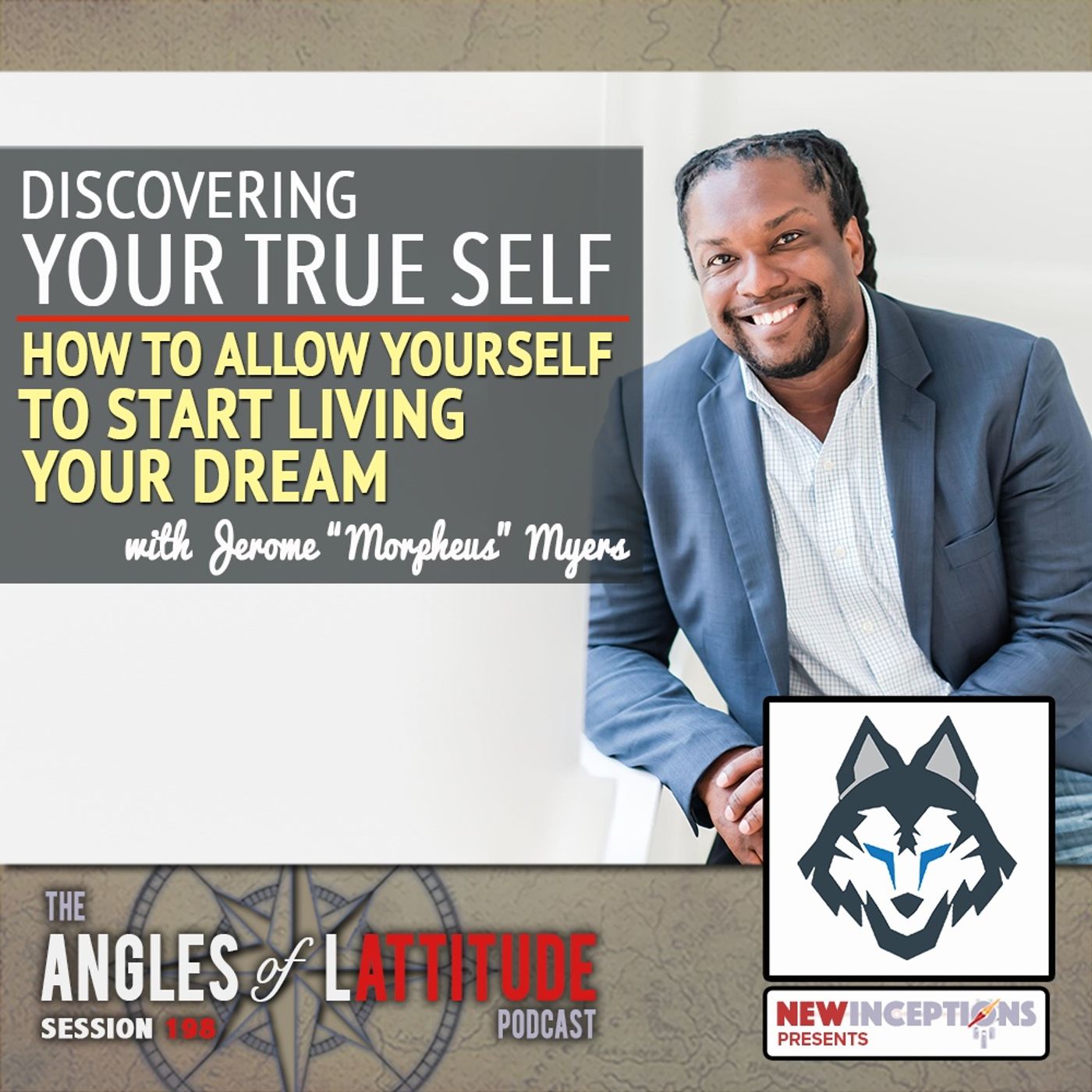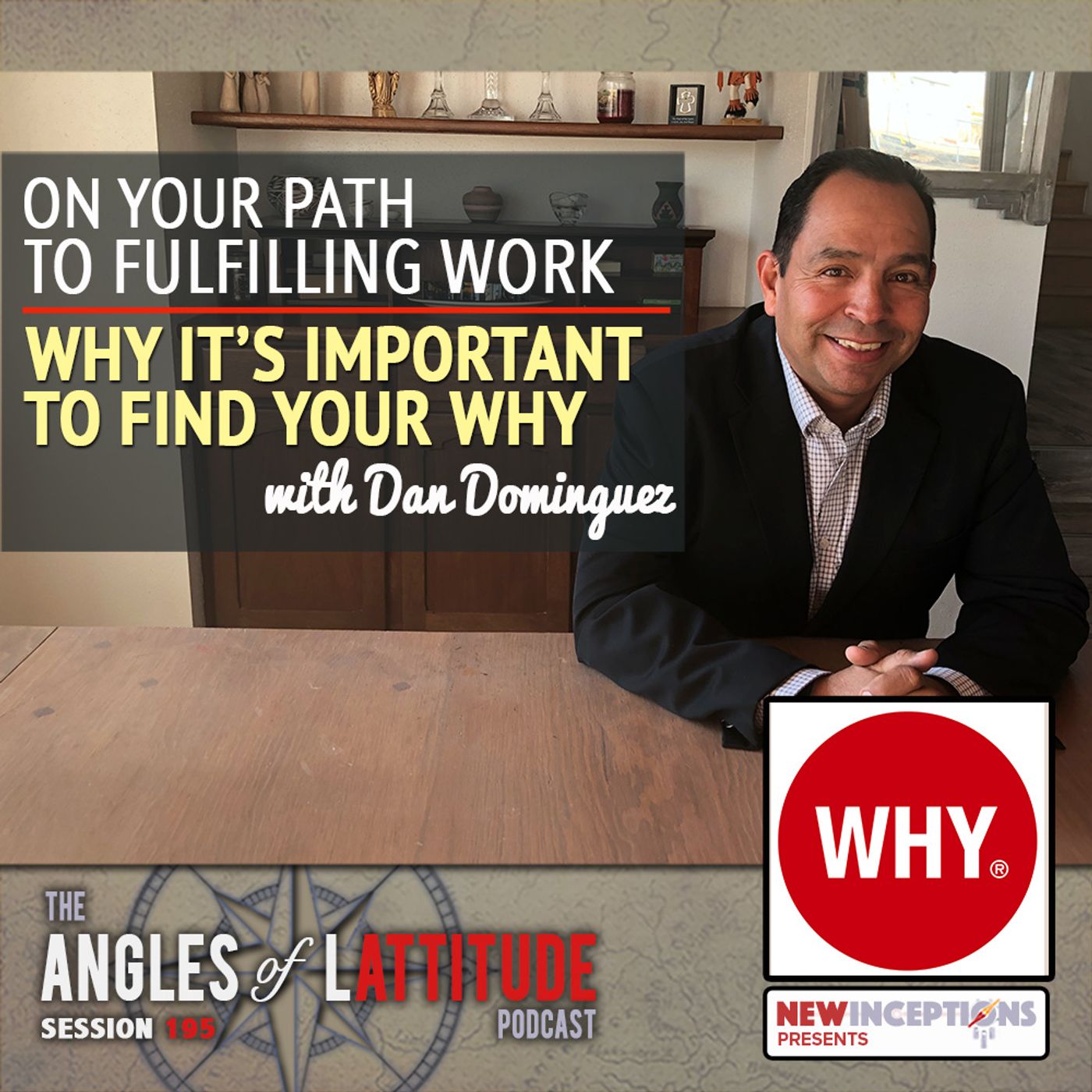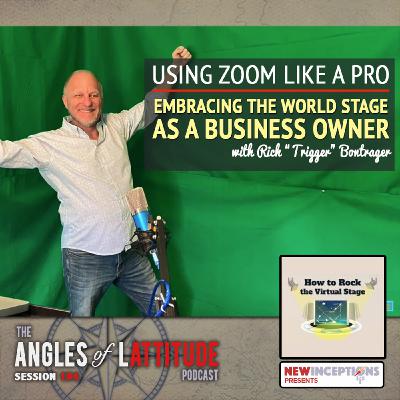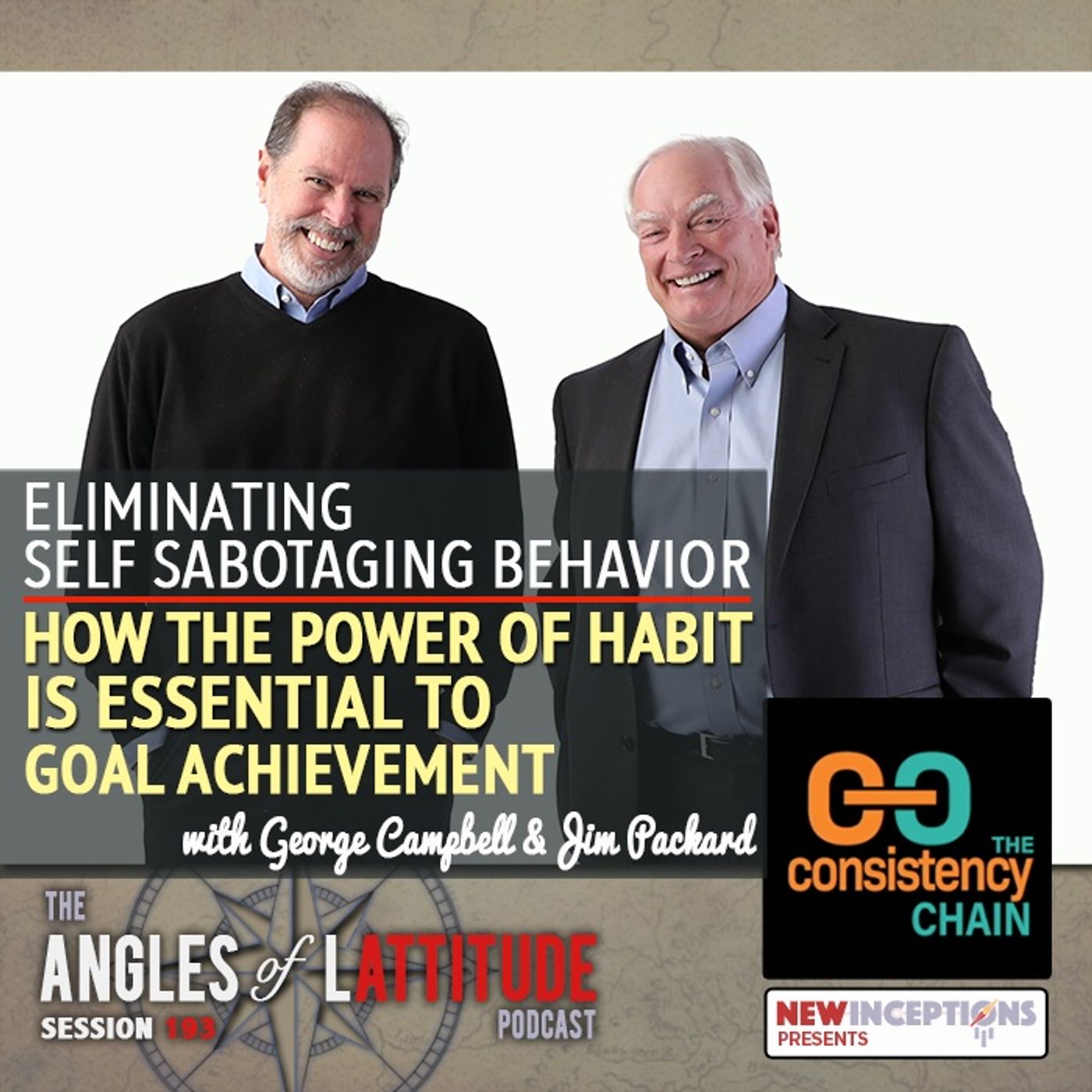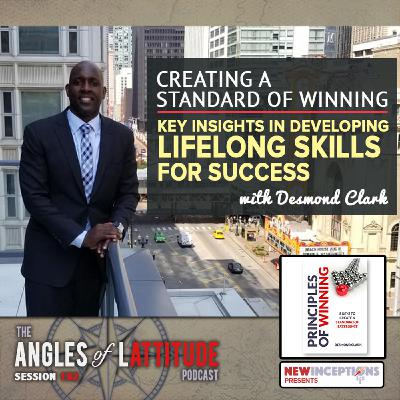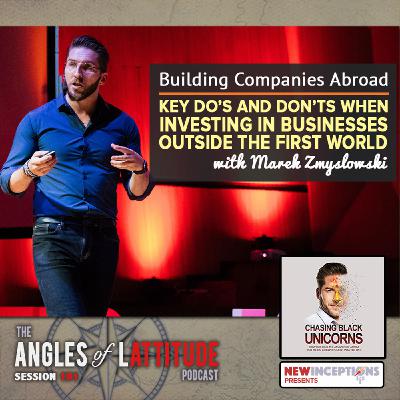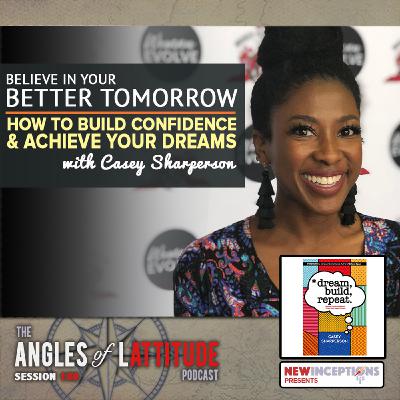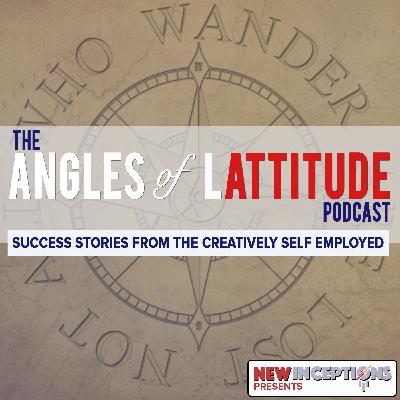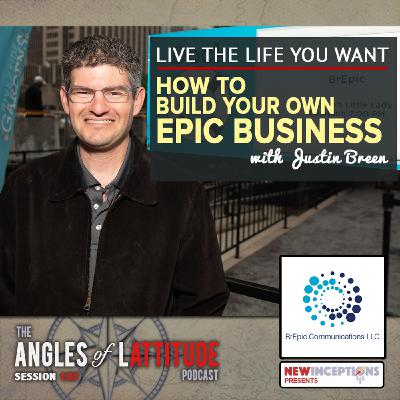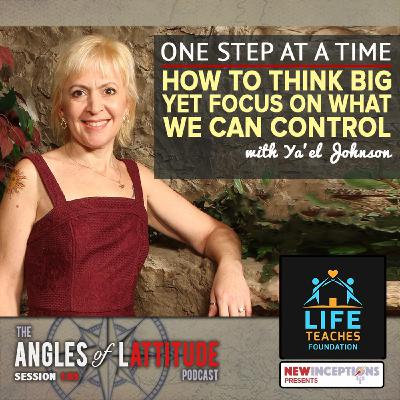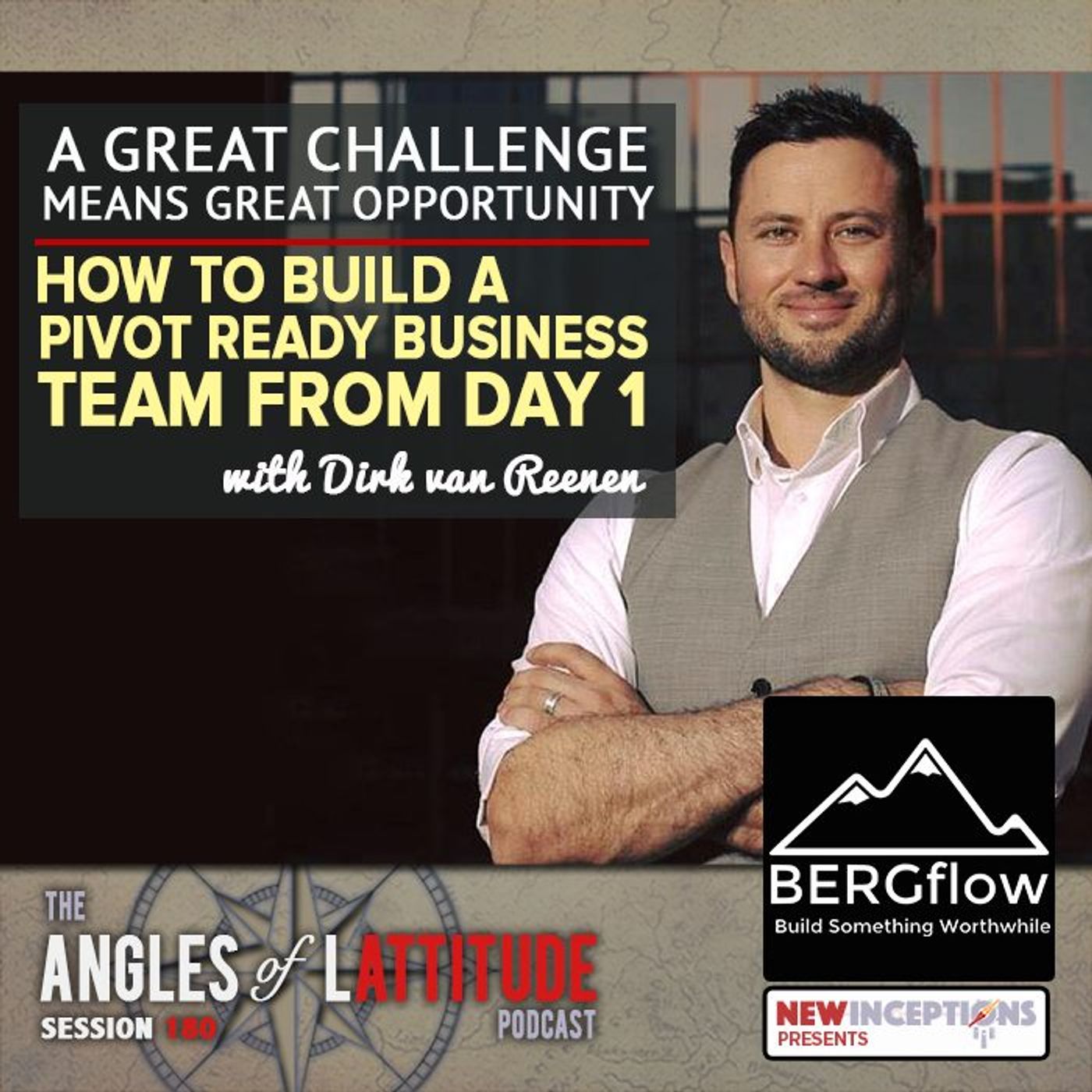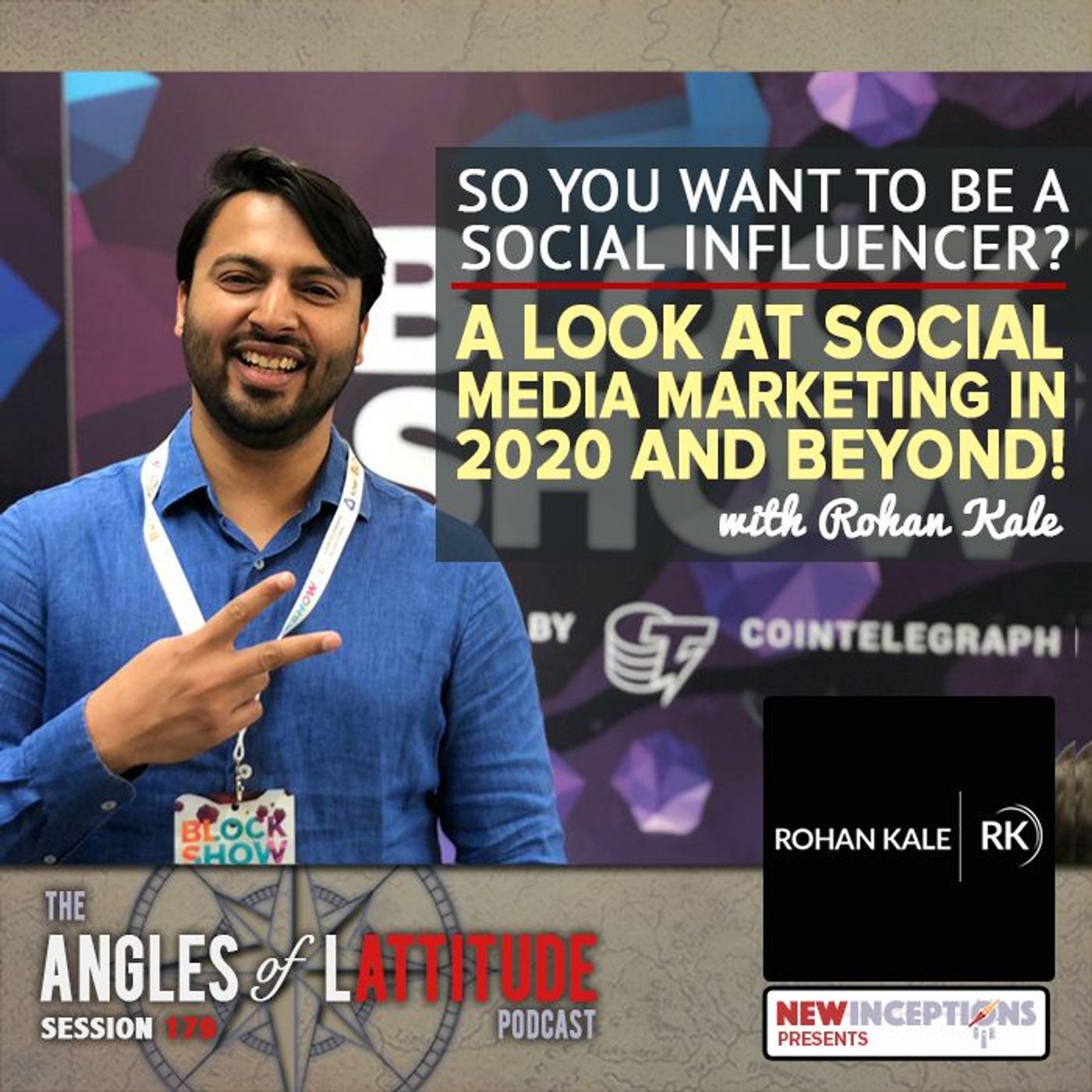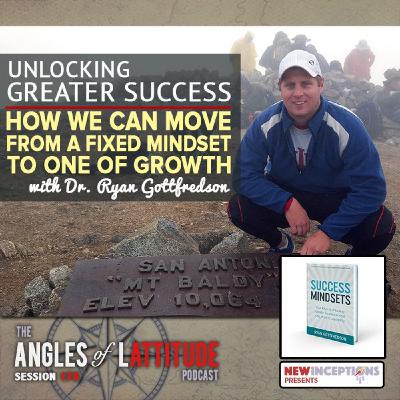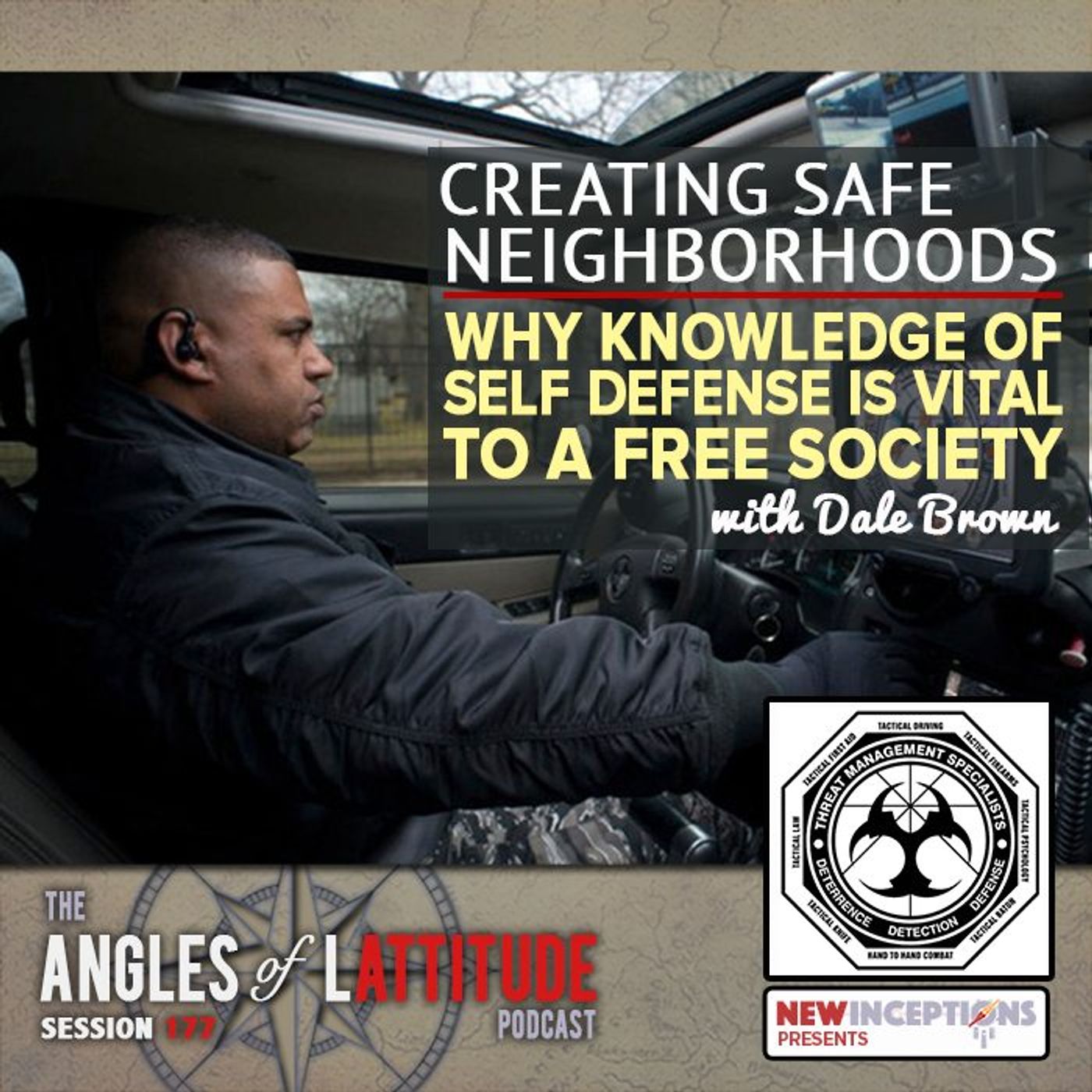Discover The Angles of Lattitude Podcast | Learn from the Successes of the Creatively Self Employed | How-To
The Angles of Lattitude Podcast | Learn from the Successes of the Creatively Self Employed | How-To
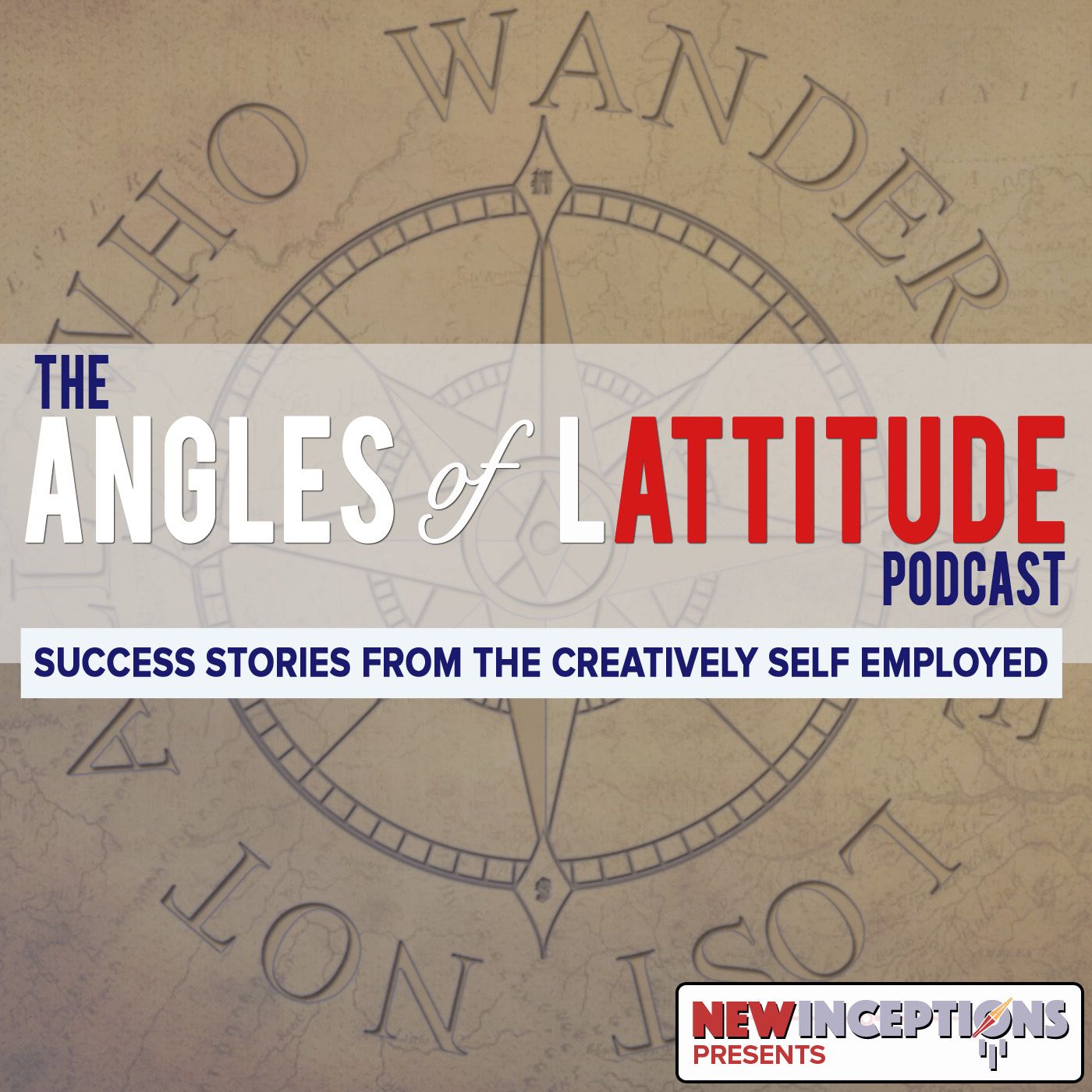
62 Episodes
Reverse
One of the things I've learned in the last 10 years (and even more so since the start of the pandemic) is many of us, including myself at times, ask if we're worthy enough to level up and start living our dream. Scratch that - OUR DREAMS.See, here's the thing. Society has told us what's important and that's the magic dollar bill. How you get it is secondary to actually getting it. Because so many people focus on the end destination (which, hint... there is no end destination), it really doesn't matter how you get the result.However, what I've learned along the way is that if you can tap into your true self and do work that has meaning to you and/or you finding fascinating, then the sky's the limit.That was true for this session's guest, Jerome Myers.As he tells it in this chat, while he was in college he realized that there are easier ways to earn income than trading time for money. In particular, he learned that multi-family housing can be particularly lucrative.More so, he realized that when he "figured it out" that others need to know how to get free from the Matrix and live their dreams as well.Listen in as he shares with us some of his thoughts on steps to finding our true selves and how we can make sure we don't live a nightmare of constantly trying to do it with little luck.Enjoy!SPECIFICALLY, YOU’LL FIND OUT MORE ABOUT:* How was Jerome given the "permission" to seek something other than a traditional day job? 14:14* Where did Jerome get the idea that he even wanted to get into real estate investing? 16:34* What makes the red pill easy to swallow for some people, while other people get choked? 21:21* Are there a couple of signs someone can look for when it comes to pursuing their dream full time? 23:50* What are three things that Jerome suggests that a dreamcatcher can do to make sure their dream doesn't become a nightmare? 26:57* Why does Jerome have multiple podcasts as opposed to bringing in a video element? 28:33* Does Jerome have any success stories of where he's been able to help others take the red pill? 34:20* When it comes to the Hero's journey, does Jerome feel like society is preventing people from living their own? 42:21* What are a handful of concepts people should consider before they leave a successful 9 to 5 career to go do their own thing? 44:39* How does someone make their job making revenue streams for their family? 50:11* What future dream does Jerome want to pursue himself? 53:26* Who were Jerome's top 3 influencers who helped him get to where he's at today? 55:01* What's the best advice he's ever received? 56:46* Is there something he's become good at saying no to? 57:20* What's the piece of advice he likes to give others? 57:50* What does it mean to live a life of abundance? 58:16ITEMS and PEOPLE MENTIONED IN THIS EPISODE:Jerome Online: Website, Facebook, LinkedIn, Instagram, YouTubeCohost: Andy DixPowered By: Uncover Your Personal Mission12 Stages of the Hero’s Journey
When it comes to my work here at New Inceptions, one of the most often asked questions I've received is "JC, how did you find your why?" 10 years ago, I wouldn't have really known what they were talking about. I hadn't really thought about my motivators in life. Sure, I had thought about my personality and what I was naturally attracted to doing, but not what actually goes behind that thinking.In fact, when I first heard Simon Sinek's "Start with Why" presentation, it made since how he was relating it to companies, but it hadn't really clicked for me how it related to people. That wouldn't be until later. However, someone it did click with at the personal level was the founder of the Why Institute, Gary Sanchez.In this chat, Gary's right hand man, Dan Dominguez shares with us in his own words where he was when he stumbled upon Gary's work and how Gary actually put the work together.More specifically we'll learn how Dan is now living his best life due to the work Gary has done as founder of the Why Institute.If you're still struggling to figure out your own Why, perhaps getting some time with Dan might be in your not too distant future? Enjoy!SPECIFICALLY, YOU’LL FIND OUT MORE ABOUT:* What were the circumstances that pushed Dan to start searching for a career change? 11:05* Why did Dan actually decided to join Gary to help build the Why Institute? 24:46* Are there certain questions the Why Institute employs to find someone's Why? 29:59* What does Dan want for people to remember as the world continues past the pandemic? 38:53* What are some of the things he's looking forward to moving forward with the Why Institute? 42:38* Which three books does he share with other people? 45:07* What message out there is a disservice to youth? 45:46* Is there something he'd like to do in his life that no one knows about? 47:30* Provided it was cost free, what ad would he place out in the world? 48:25* How can someone quickly find out if they're already living their personal mission? 49:47ITEMS and PEOPLE MENTIONED IN THIS EPISODE:Dan Online: Website, Facebook, LinkedIn, Twitter, InstagramCohost: Veronica KirinPowered By: FizzleRoad Less Stupid - Keith Cunningham (Amazon Link)Heroic Leadership - Chris Lowney (Amazon Link)Play bigger - Al Ramadan (Amazon Link)Copper Canyon RacesRight click here and save-as to download this episode to your computer.SHOW NOTE EXTRAS:9 Whys of the Why Institute
In 2020, using Zoom has become commonplace for businesses and schools alike. Since so many people have become familiar with the platform, it only makes sense that there are ways we should or shouldn't use the platform. Whether you're a business leader, a member of a nonprofit, or a teacher, no one wants to attend a zoom meeting where the presenters aren't engaging.In this session of the show, Andy and I have the opportunity to speak with someone who has made it his mission to help others harness the power of the virtual stage.More specifically, the Trigger, Rich Bontrager, coaches his clients to be better presenters through time proven broadcasting techniques.In this conversion, we explore why his approach makes such a big difference when you're trying to seperate yourself from the pack in virtual presentations.Enjoy!SPECIFICALLY, YOU’LL FIND OUT MORE ABOUT:* Even though Rich grew up with a stutter, how was he initially called into the speaking world? 10:16* Where many people might use bad experiences as excuses to not overcome, Trigger has used them to catapult them to the next level. How has he been able to do that? 12:09* What has Trigger learned from his past experiences which have made him a better communicator? 15:34* How did he get started in pastoring? 16:52* How can someone learn to regularly change of their pace a bit when it comes to speaking? 21:22* What are some things leaders shouldn't hesitate to implement as we're going forward in 2021? 23:44* How can someone come off as authoritative, confident, and natural on Zoom? 28:09* What are common blunders business leaders make when they go onto the virtual stage? 31:39* Where should we focus our eyes in a Zoom conversation? 33:46* What are some things people should be looking forward to going forward in this new world of online stages? 37:40* What in particular is Rich looking forward to as we move into the pandemic adjusted economy? 40:05* Who are three speakers who have launched Rich to where he's at today? 42:49* What's the biggest plot twist he's experienced in day to day life? 43:15* What's something every high school student must know? 43:52* Who gave him the best advice he's ever received? 44:13* What's it mean to live a life of abundance? 44:43ITEMS and PEOPLE MENTIONED IN THIS EPISODE:Rich Online: Website, Facebook, LinkedIn, Twitter, InstagramCohost: Andy DixPowered By: Uncover Your Personal Mission.Andy’s 31 Questions Only You Can AnswerRight click here and save-as to download this episode to your computer.SHOW NOTE EXTRAS:Green Screen Tips and Tricks
Self sabotaging behavior is a common theme when it comes to personal and business development (or the lack thereof). Whether it's the lack of willpower to get healthier, the determination it takes to go through college, or the focus it takes to build one's business, there's one thing that is certain when it comes to accomplishment: setting a goal is one thing - but actually achieving that goal is something completely different.In this session of the show, Ya'el Johnson and I get to talk to two completely different kinds of individuals who have made it their passion to help others figure out how to achieve goals like this.Through their app called the Consistency Chain, they're helping tons of people build good habits in place of the ones that have lead them to where they are now.In their recent book built on the same premise, The Consistency Chain for Network Marketing, authors George Campbell & Jim Packard suggest that the main reason that people don't do well with network marketing is that they simply haven't built the right habits to actually grow their business. Interestingly, George goes on to say that he was only successful when he realized he was the common denominator between all these opportunities.In this conversion, we explore how they came to that conclusion and some of the concepts one should consider when trying to achieve anything in this world - let alone building a network marketing business!Enjoy!SPECIFICALLY, YOU’LL FIND OUT MORE ABOUT:* As enthusiasts of the industry, how did George and Jim get into Network Marketing initially? 12:55* How do you know when you're working with the right business when it comes to network marketing? 21:18* How did Jim & George realize they were on to something when they felt the 80/20 rule applies to those who are successful in network marketing? 26:24* How do they give themselves milestones on a regular basis to keep them going in their journey? 30:17* What are some of the ways that people are using the Consistency Chain app in their daily lives? 37:17* What are some of the things George and Jim are looking forward to moving forward in 2021? 42:10* Who are Jim and George's personal influencers and teachers? 45:23* What's the biggest plot twist they've seen in their day to day life? 48:43* Is there a particular gift they like giving others? 50:31* What is something they've become good at saying no to? 52:33* How does someone realize they're living their own personal mission? 53:59ITEMS and PEOPLE MENTIONED IN THIS EPISODE:George and Jim Online: Website, Facebook, LinkedInCohost: Ya’el JohnsonPowered By: Groove Funnels - Join Us in Exploring the power of this awesome new tool! (Get started free today!)Marshmallow TestSeinfeldJay Abraham - Getting Everything You Can Out of All You Got (Amazon Link)Jim RohnDale Carnegie
As we're getting started in this second year of potentially a two or three year pandemic "clean up" plan, there's going to be plenty of time for us to really adjust and think about where we fit in the world. It's a great time to develop our skills for success.What do I mean by that? Well, it's a forced transition period for all of us. What might have been our identity in the past, might not work in the PAE.That said, one group of individuals who all have to go through this major life change sometime in their career are professional athletes. Like our guest, Desmond "Dez" Clark says, if your identity was wrapped up into your job (as an athlete), you're going to have issues when you can't do that job anymore.Luckily for Dez, he knew who he was before his career as a professional athlete. So when he finished up, yes, there was a transition period, but he was the same Dez who used the game as a means to get what he wanted.In this chat with him, Ya'el and I learn a little bit of what he's learned over the years through these transitions and how he's been able to stay the course during his life using those experiences.Enjoy!SPECIFICALLY, YOU’LL FIND OUT MORE ABOUT:* Where did Desmond's early leadership mentality come from? 8:46* How did he develop a vision for his athletic life and able to stick to it? 12:11* When did Dez realize it was time to transition into a new life/identity? 17:07* Why does he believe his success wasn't a coincidence? 20:50* How did Dez start realizing that failures aren't necessarily endings but just learning opportunities no matter the cost? 25:00* How does he actively build relationships to help him and those around him get to the next level? 28:11* Is there a secret to gauging if a conversation is a winning conversation? 29:43* What's a bad day look like to Dez? 38:25* What is he looking forward to in 2021? 41:06* Which teachers have helped him get to where he's at today? 42:53* If he could ask anyone living a dead a question, who and what would he ask? 43:11* Which issue should be discussed more today, yet hardly anyone does? 44:01* What advice does he hear adults give children which he'd like to call BS on? 44:21* What's the secret to achieving personal freedom? 45:02ITEMS and PEOPLE MENTIONED IN THIS EPISODE:Desmond Online: Website, Facebook, LinkedIn, Twitter, InstagramCohost: Ya’el JohnsonPowered By: FREE GUIDE: Uncover Your Personal MissionRight click here and save-as to download this episode to your computer.SHOW NOTE EXTRAS:Highlights from Dez’s NFL CareerDez shares discusses his role as President of the NFL Alumni Chicago ChapterKevin Hicks interviews DezTim Schumm interviews DezThanks for Listening!
Welcome to 2021, everyone. What an interesting ride it's been... and we're not out of woods yet. However, if you're interested in building companies (and who isn't these days?), I'm really feeling hope in the air. Hope of a fresh start.If anyone knows about fresh starts, it's this session's guest Marek Zmyslowski. He's had a couple in his career - but one he's most notable for is the one he had to go through as he was writing his book Chasing Black Unicorns.In his book, Marek shares with us the story of why and how he built the Amazon of Africa... but then how selecting a bad business partner eventually got him in hot water with Interpol... and what he learned from the whole ordeal.In our conversation with Marek, new co-host Ya'el and I explore some of the items Marek has learned you want to do or don't do when you're building companies in up and coming countries.Enjoy!SPECIFICALLY, YOU’LL FIND OUT MORE ABOUT:* What was Marek's first business? 10:08* What were some of the key steps he took to get some of his first ventures started? 14:23* How did Marek come to the decision to buy out his business partner when things started going south? 17:54* How was Marek able to move past the drama with Interpol and his business partner? 23:19* In which ways has Marek been able to leverage his experience into positives today? 29:12* What has Marek done for his own pandemic pivot? 32:04* Who are three influencers or teachers which have helped him get to where he's at today? 35:47* What's been the biggest plot twist he's seen in his day to day life? 37:56* What's something he feels is going to change entrepreneurship in the future, and what specifically is he excited about? 39:15* Which message in the world is a disservice to youth? 43:49* How can someone be a difference maker in their community? 47:13ITEMS and PEOPLE MENTIONED IN THIS EPISODE:Marek Online: Website, Facebook, LinkedIn, Twitter, InstagramCohost: Ya’el JohnsonPowered By: Groove (formerly Groovefunnels) - Get all your online marketing needs under one roof... currently for a lifetime deal!Tony RobbinsTim FerrissJoe Rogan’s podcastRight click here and save-as to download this episode to your computer.SHOW NOTE EXTRAS:Introduction of Chasing Black UnicornsMarek’s TEDx on becoming Interpol’s most wanted criminalMarek’s talk on the LetsDoHumans PodcastMarek Chatting with Candice Horbacz
As we're quickly hurtling towards 2021, many a young professional is finding it harder and harder to sync into the "real world" once they're out of college. For me, it's been over 10 years since I got out. And it took me quite awhile to get my bearings. I can only imagine what it's like now as the world is changing faster and faster outside the ivory tower of academia.Personally, I think 2020 has been a wake up call in more ways than one. Sure, we've been talking about pivoting all year since the virus officially dropped. But one thing we haven't discussed is the need for better networking skills.For yours truly, I struggled with this for awhile when I got out of school. In fact, I wasn't all that great at it even when I started this podcast. However, it was through the podcast, that I have been able to build my networking skills. It's definitely not the same perspective I have on the art as I did when I first entered into the "real world". It would have been nice to have been taught some of the stuff you'll learn in today's conversation in school.So, if you're a young professional, entering the workforce, or have an expendable entry level position, what can you do to hedge your bets? Well, I think a great start is to look at someone like Emily Mishler as a fine example of how to get yourself out there.Listen in as Andy and I find out how she's been able to reach the professional level she has as a late 20-something.Enjoy!SPECIFICALLY, YOU’LL FIND OUT MORE ABOUT:How was Emily able to be as productive as she was during her college years? 11:08How can a young professional leverage their network to build something they'll be really proud of? 15:44What are some common misconceptions that younger people have about networking? 18:37If someone wants to begin networking, what would Emily recommend as a starting strategy? 23:03What advice would Emily have for those who have multiple passions and is having a hard time focusing on single passion because they feel if they focus on one that it will be on the expense of the others? 29:11How has Emily been able to pivot in 2020? 31:46What is Emily's favorite opening line for networking? 35:12Which one book, one film, and one song would Emily add to the national curriculum? 36:06What has she been learning about recently that she's super excited to implement? 36:36Is there something specific that each high school student must know? 37:49What's it mean to live a life of abundance? 38:29ITEMS and PEOPLE MENTIONED IN THIS EPISODE:* Emily Online: Website, Facebook, LinkedIn, Instagram* Cohost: Andy Dix* Powered By: Uncover Your Personal Mission* Cobra Kai* The Alchemist by Paulo Coelho (Amazon Link)* Eat Pray Love* Don’t You Worry Bout a Thing - Stevie Wonder
As 2020 is coming quickly to an end, we're moving closer to favorable conditions to be creatively self employed. However, that might be easier said than done. For many, the pandemic has set people back in more ways than one. If we want to build confidence going into the new year and to be a player in the Pandemic Adjusted Economy (PAE), we'll likely need to rebuild and equip ourselves with new expectations of what's possible.Personally, I feel that 2020 has helped me reflect and improve my vision of what my businesses can be. In fact, we're improving the model of everything I'm involved with. I've certainly learned a few lessons from this past year. More so how to build businesses that are pandemic proof!However, I understand that not everyone has been able to gain that clarity. In fact, I think a lot of people who've lost their business aren't quite sure how to pick things up to rebuild. Or, even if they'd want to. Or maybe, someone's been waiting for the best time to start out on their own - but they're especially not sure if NOW is the best time to get started.Here's the thing: everyone who was affected by COVID-19 will still have to start from a level playing ground when we're given the greenlight to begin again.So don't let your fears hold you back. Reach out and find those who can be a catalyst for what you're trying to achieve.One such person I'd recommend reaching out to is this session's guest, Casey Sharperson. In this conversation, she shares with us how she made the jump BEFORE the pandemic hit and how she's already helping others do the same.Listen in as Veronica and I find out what it means to take charge of your story and use it to your advantage to move forward.Enjoy!SPECIFICALLY, YOU’LL FIND OUT MORE ABOUT:* Who was Casey growing up and how would her own Disney movie begin? 9:44* How did her mentor, Alice Carson Tisdale, affect her and where she saw her life going? 12:17* Was there a "catalyst moment" during her corporate career which made Casey start on her own path? 18:41* When it comes to working with Millennials, where does she start in the process of helping a client? 23:54* How can someone use rejection as a catalyst for change and growth themselves? 28:05* How has Casey pursued her vision as opposed to simply dreaming and hoping things will come true? 32:45* What's it take to leverage one's own story to build a brand and fans who love them? 37:06* If someone hasn't found their "story" yet, is it possible for them to build a brand? 40:30* Has any of her clients realized their own personal story under her watch, and if so, what was the transformation like? 43:31* What would the world look like if everyone had their own personal transformation experience where they actually step into who they are? 47:17* What in particular is Casey focused on for the near future? 48:43* Who are three influencers/teachers who have helped her become who she is today? 50:28* What gift does she like giving others? 52:50* Which issue does she believe more people should be discussing yet hardly anyone is? 53:48* Which ad would she place into the world if it didn't cost anything? 55:16* How can someone be a difference maker in their community? 55:38ITEMS and PEOPLE MENTIONED IN THIS EPISODE:Casey Online: Website, Facebook, Instagram, YouTubeCohost: Veronica KirinPowered By:
In 2020, it's been relatively easy to put on a few pounds since we're all more prone to living a sedentary lifestyle. That's why the Quarantine 15 has become a thing. However, that's really a bad excuse to not take care of yourself. So, for the holidays, I wanted to make sure we released a conversation with someone who can help us work-o-holic creatives be a bit more mindful of how we're treating ourselves during the last stretch of the year.While our guest Sameera Khan typically works with bariatric surgery candidates, she has some great tips for the rest of us.Listen in as Veronica and I explore a handful of tips we should keep in mind to keep ourselves from binging and/or staying on track for our holiday meal planning.Enjoy!SPECIFICALLY, YOU’LL FIND OUT MORE ABOUT:* What was the spark that drew Sameera towards a career in the health field? 11:03* How can someone become more aware of where they're at in their own personal care? 15:52* How would the work-a-holic use this knowledge in their day to day? 18:31* What is someone facing when they're looking at bariatric surgery? 21:40* What kind of actions does someone need to take after bariatric surgery to stay healthy? 26:00* Why would someone want to shift their carb intake and what are some tips someone can do that? 28:03* What is Sameera focused on for the rest of this year and going forward? 33:24* Which 3 books does Sameera find herself giving or telling others about the most? 35:30* Is there a documentary she recommends people check out? 36:17* What is something she believed as an 18 year but has realized is completely inaccurate and why? 37:17* Which three personal truths would Sameera want others to know? 38:52* What does it mean to live a life of abundance? 40:40ITEMS and PEOPLE MENTIONED IN THIS EPISODE:Sameera Online: Website, Facebook, InstagramCohost: Veronica KirinPowered By: Uncover Your Personal MissionRegain Be Gone (Amazon Link)Obesity Code (Amazon Link)Whole30What the HealthCuriosity Stream (free with your subscription to Scribd!)Right click here and save-as to download this episode to your computer.SHOW NOTE EXTRAS:Rob’s testimonial of the journey she’s been on with SameeraEd’s testimonial of Sameera’s workDenise Walsh speaks with Sameera about Keeping Weight OffDr. Oz on the Paleo DietThanks for Listening!
In the last five years, I've learned a lot of things from doing this show. If someone is looking, I really think it can help someone live the life they want. However, while I might have learned plenty since starting the show, I'd say a big part of that knowledge is simply developing new perspectives on what I already thought I knew.While I've had several changes of perspective, three have stood out the most this year.The first big perspective change I had was that it really does take awhile to master a craft. For example, while I feel I know a lot about producing a great sounding show, there's always tweaks I can be making to improve the show as a whole. But it's only from that experience that I know to make those changes. You're not going to learn meaningful knowledge overnight.The second perspective shift I've received from the show was actually a big game changer. I realized the more people are doing work aligned with what's important to them in life and how others see them, the closer they are to doing work that isn't really... work.And the third realization came from understanding this past year one thing: The more people you meet and let into your life, the more opportunity you have to grow.I share those three perspectives with today's guest, Justin Breen.In fact, when I realized he was building his business on these three core beliefs, it occured to me that I should probably embrace them more myself.Listen in as he shares with Veronica and I why these beliefs are important to him and how they've empowered him to live the life he's proud of.Enjoy!SPECIFICALLY, YOU’LL FIND OUT MORE ABOUT:* What initially drew Justin to a career in journalism? 9:13* In 2017 Justin realized there was a shift in journalism. What happened that made him realize it was time to start to live the life he desired? 11:43* What inspired Justin to write his book Epic Business the way he did? 18:04* What are some of the things someone should expect to learn about in his book? 19:53* How can someone put their family needs first when they believe the work that they're doing is supporting their family long term? 24:01* How important is a knowledge of PR and media connections in business success? 31:09* For someone who's just starting out in their business, what should they know about being more respectful of journalists and building relationships with them? 34:26* How did Justin learn the skill of leading with relationships in building his business as opposed to being highly transactional? 37:58* What does the future of BREpic look like and what is he looking forward to? 43:25* Who are Justin's favorite teachers who have helped him get to where he's at today? 45:21* Which documentary would he recommend people check out? 45:37* What's the best advice he's ever received? 45:58* Is there an issue more people should be paying attention to? 46:12* What's it mean to live a life of abundance? 46:36ITEMS and PEOPLE MENTIONED IN THIS EPISODE:Justin Online: Website, Facebook, LinkedIn, TwitterCohost: Veronica KirinPowered By: KennectedGreg Reid AoL InterviewEpic Business - Justin Breen (Amazon Link)
Believe it or not, but there's a lot of people in this world who are afraid to think big. The reason for this is pretty simple... at least to them. Why think of making a huge impact when you can't even get your own life straight?What I've learned is that having big goals and dreams actually helps one deal with the now. If we have a worthwhile goal, it allows us to prioritize it. And that, allows us to not prioritize what's good now... or at least the actions that might self sabotage us in the long run. In other words, if you have an elephant to eat, that's how you eat it - one bite at a time.In this session with friend of the show, with newly married Ya'el Johnson, Andy and I chat with her about what she's learned about life and success as she's taken control over her own life and destiny. This is a great lesson if you're new to the self development world, but also a great reminder for those of us who might feel down due to the ongoing effects of COVID-19. Enjoy!SPECIFICALLY, YOU’LL FIND OUT MORE ABOUT:* How does Ya'el remember getting into the personal development space? 10:46* According to Ya'el, why is it necessary for people to control what they can in their lives? 12:10* What tips does she have for someone whose been living a horror story and are trying to get out? 19:25* What got her interested in aiding in homelessness in the town she's living in? 23:33* How can someone tackle a big project like homelessness in their own community? 27:48* What can we expect to hear from Ya'el's podcast? 35:01* What's going on for Ya'el in the not too distant future? 39:43* Who are her three influencers or teachers who have helped launch her to where she's at today? 41:25* What is the most powerful question she likes to ask her coaching clients? 41:59* What message is out there that's a disservice to youth? 43:29* How does Ya'el deal with getting overwhelmed? 46:22* What's it mean to live a life of abundance? 47:50ITEMS and PEOPLE MENTIONED IN THIS EPISODE:* Ya’el Online: Website, Facebook, LinkedIn, Twitter, YouTube* Cohost: Andy Dix* Powered By: Uncover Personal Mission* Brendon Burchard - Millionaire Messenger* Regis Philbin's passing and effect on the South Bend CommunityRight click here and save-as to download this episode to your computer.SHOW NOTE EXTRAS:Ya'el's Poem "The World I See Beings with Me"Abraham Hicks - How to Make Big Things HappenBrendon Burchard - Working on Self PerceptionTony Robbins - Achieving Meaning and Real Success in Life
It's said that college can either teach you what to think or how to think. And in my case, I'd like to believe that it taught me how to think. But looking back, especially this past year, I've realized when it comes to creative thinking, my Purdue career might have failed me. Not because I didn't get anything out of it. I did. However, when I got out of grad school, I found myself trying to build staircases out of information.That's just not how the world works. Especially when you're trying to start or restart a business.In fact, when you're learning something new, using a circular or global way of learning to connect the dots might make more sense to utilize than a linear model.In this session with Emmy award winning documentarian Lois Stark, Veronica and I chat with her about what what she's learned about shapes and patterns in nature, and how those relate to our ability to think now and in the future.Enjoy!SPECIFICALLY, YOU’LL FIND OUT MORE ABOUT:* What fostered Lois' interest in becoming a documentarian? 8:38* Are there specific ideas people can remember as their world continually shifts around them? 11:57* How can we get a little higher to see beyond the divisions of mankind? 24:11* How can adults reshape their mindset so we can access the future before it unfolds and possibly influencing it based on what we know from the past? 29:11* What advice would she give to business owners in riot zones who want to stay in business, but also need to be cautious about how they engage with their community? 41:32* What is Lois working on now and what does she expect for its impact in the future? 47:17* Who are three of Lois' influencers or teachers who have helped her get to where she's at today? 52:47* What are three books she gifts or tells others about? 56:51* In the last five years, which belief, behavior, or habit has most improved her life? 59:42* What happens regularly today which would horrify a person from 100 years ago? 1:01:35* How can someone be a difference maker in their community? 1:03:28ITEMS and PEOPLE MENTIONED IN THIS EPISODE:* Lois Online: Website, Facebook, Twitter* Cohost: Veronica Kirin* Powered By: Fizzle - Use a Roadmap to create your business with different thought processes in mind!* Synthesized DNA to store data* Joseph Campbell - Power of Myth; Hero with a Thousand Faces* Carl Jung - Man and his SymbolsRight click here and save-as to download this episode to your computer.SHOW NOTE EXTRAS:Lois' TEDx PresentationUnderstanding Fractal Thinking with Keith McGreggor
There's a lot to be said when it comes to having a personal breakthrough. In fact, having one might just change the rest of your life. However, when it comes to having a breakthrough through an identity shift, what does that actually mean? Shouldn't a breakthrough come before having a change of identity?Interestingly, according to today's guest, Rob Scott, you can find a way to change your perspective on who you are and how the world influences you. Not only that, but when you do, the world can become a much more friendly and/or productive place.In this session, Andy and I chat with Rob about how he could have had all the reasons to be a failure at life, but instead used identity shifting techniques to become the person he is today.Enjoy!SPECIFICALLY, YOU’LL FIND OUT MORE ABOUT:* How did Rob discover his fundamental shift? 9:35* What kind of identity shifting techniques did he have to use to get to where he's at today? 15:14* What mindset issues does Rob typically see while working with his clients? 22:17* There's three steps to changing one's limiting beliefs: awareness, a new choice, and a subconscious pattern. What do those mean, exactly? 23:51* How does someone install a new lens in how they see the world? 26:34* What would it be like working with Rob when he'd be helping with identity shifting? 38:04* What is Rob looking forward to in his work? 50:09* Is there a power coaching question Rob likes to ask his coaching clients? 52:02* What are three books Rob gifts or gifts to others? 53:05* Why is self sabotage such a problem amongst most human beings? 54:10* What's one thing every high school student must know? 55:44* Is there a secret to achieving personal freedom? 56:52ITEMS and PEOPLE MENTIONED IN THIS EPISODE:* Rob Online: Website, Facebook, LinkedIn, Twitter, Instagram, YouTube* Cohost: Andy Dix* Powered By: Uncover Personal Mission* David Bohm - J. Krishnamurti - The Ending of Time;* David Bohm - Thought as a System* Dane Maxwell AoL Interview* Dane interview on the SPI PodcastRight click here and save-as to download this episode to your computer.SHOW NOTE EXTRAS:Rob at The Foundation Live Event 2015Rob Talks @ GoogleThe #1 Skill in Personal DevelopmentHow to Change Your Story - Tools to Use to be Resilient
When you're starting anything in the business world, it's a really good idea to know who your target audience (or avatar) is. Some businesses might have many options, while most actually have a handful or less.Generally speaking, when you're starting a podcast, it's no different. Sure, there's a few podcasts out there that practically anyone can listen to, but for the most part, shows need to be tailored to the audience. This is especially true if the host isn't well known.When this session's guest, Joe Sanok, started his podcast, not many people knew who he was outside of his therapy work. However, with a podcast name of Practice of the Practice, it only makes sense that people who were looking to build their private practice would find his show.In this session, Veronica and I chat with Joe about the importance of knowing your audience and successfully building a brand around their needs.Enjoy!SPECIFICALLY, YOU’LL FIND OUT MORE ABOUT:* What lead Joe to realize he had to retire from his therapy practice to build his current business of Practice of the Practice? 9:49* How did he realize it was time to sell the therapy practice that he had been building for years? 13:44* What inspired Joe to start his podcast in the first place? 15:34* Is there anything in particular he's learned by running a practice that he can apply to what he's doing today? 17:16* What ideas does he think keep people back from creating something which has a high level of scale and influence? 18:56* When someone believes they have limits in their lives and business, what questions should they be asking themselves if they want to move forward? 20:47* How can someone make a podcast about an industry that might seem too limited in scope? 23:56* Are there key elements a new podcaster should consider if they're starting a show in a particular niche? 26:25* Has Joe had to go through any particular pivots this year? 40:28* If he could add one song, one book, and one film to the national curriculum, what would they be? 42:35* What's a message that's out there which is a disservice to youth? 43:42* What's something that costs less than $100 which has changed his life? 44:06* Is there something he'd like to do in his lifetime that no one knows about? 45:23* What's the secret to achieving personal freedom? 45:54ITEMS and PEOPLE MENTIONED IN THIS EPISODE:Joe Online: Website, Facebook, LinkedIn, Twitter, Instagram, YouTubeCohost: Veronica KirinPowered By: Fizzle (Community for the Newpreneur!)Kelly HigdonJoe's Course: Podcast Launch SchoolFireball - Pit BullMichael Pollins - How to Change Your MindThe Untold History of t...
When it comes to the stock market, the most knowledge people typically have is letting someone else manage their portfolio. Robert Kiyosaki strongly urges people not to do this because, generally speaking, those that do manage other people's money do so in whatever way they can earn the most commission. So, where does someone look if they're interested in finding out more about day trading for beginners?For me, this has been an answer I've not been able to find a solution to for the entirety of this show. We've had plenty of guests who have built their businesses in the B quadrant, and we've had several reality stars who have built a great portfolio in the I quadrant. However, we've never had an expert on whose focus is helping those who want to build wealth through paper assets. Until now.More often than not, people generally build an S quadrant business, scale it through the B quadrant, and then take their profits and buy assets in the I quadrant.However, there's no rule that says you can't start slowly in the I quadrant and then build a business helping others do the same in the B quadrant. In this session Andy and I learn how our guest Jason Brown ended up doing just that with The Brown Report and Power Trades University.Enjoy!SPECIFICALLY, YOU’LL FIND OUT MORE ABOUT:* How did Jason get started in the stock market? 13:14* How does someone know if they're investing in a good investment in financial education? 20:59* Why should someone even think about passive income in general? 27:06* What are some keywords someone who wants to make money on the stock market should be paying attention to? 29:51* What kind of personal traits should someone have if they're considering getting involved with the stock market? 32:37* Is there something specific about Jason's process that works for him and others? 38:05* How can someone convert their business' profits into another revenue stream successfully? 41:33* What is Jason looking forward to in his business and the market? 45:48* Which podcasts are his top 3 most influential? 47:37* Is there something he's gotten better at saying no to? 48:43* What's something he's learned about recently and excited to implement? 50:49* What is one concept every high school student must know? 52:32* Is there a secret to living a life of abundance? 54:28ITEMS and PEOPLE MENTIONED IN THIS EPISODE:Jason Online: Website, Power Trade University, Facebook, LinkedIn, Twitter, Instagram, YouTubeCohost: Andy DixPowered By: KennectedScience of Getting RichIncrease Your Financial IQThink and Grow RichSPI Podcast
On the show, we've asked several of ours guests a particular question when we know they've had the answer. And that question is simply this "How did you get on TV?"Interestingly, there's been a few different answers. But the one thing which was common between all of them was that they had a compelling story. The other part was that they networked into the spot.Now, I get what that means. It means that you either found someone you knew who knew the person you were trying to connect with. Or, you randomly connected with someone who could get you on. One's a little more intentional, however, both have the same result.However, what if you don't know where to start in doing that? Sure, there's courses that can teach you how to network with the right people. But wouldn't it be easier if you could just reach out to someone who could help?If you believe you're looking for that kind of person, then today's guest is someone you should connect with.Sabrina Santucci has the network and the skillset to help you on local TV and potentially help you go national. As she says, there's different strategies for each.Listen in as Veronica and I learn more about the key things we need to keep in mind as we look to get on TV.Enjoy!SPECIFICALLY, YOU’LL FIND OUT MORE ABOUT:* How'd Sabrina end up in journalism? 8:52* What helped her realize that she should strike out on her own? 9:46* Has the freedom of the local TV affiliate been taken away as media companies grow? 11:57* Has she had a process of building "hype" for stories she's done in the newsroom? 15:07* What does Sabrina recommend for pivot businesses who want to build more cohesion with their audience? 19:22* If someone wants to be featured on their local morning show, how should they go about doing that? 24:31* What are some tips Sabrina has for someone who's new to media? 28:42* Who are three influencers or teachers who've helped her get to where she's at in life? 33:19* What is her favorite social custom? 34:37* What's something she'd like to do but no one knows about? 35:44* How can someone be a difference maker in their community? 36:13ITEMS and PEOPLE MENTIONED IN THIS EPISODE:Sabrina Online: Website, Facebook, LinkedInCohost: Veronica KirinPowered By: Uncover Your Personal MissionRight click here and save-as to download this episode to your computer.SHOW NOTE EXTRAS:Chicago Housing Authority Joins Santa for a DayBlind Sailor Set to Compete During Independence Cup, US Para Sailing ChampionshipSabrina's Demo Reel October 2018Sabrina's Demo Reel May 2019Thanks for Listening!Thanks so much for joining us again this week. Have some feedback you’d like to share? Leave a note in the comment section below!If you enjoyed this episode, please share it using the social media buttons you se...
For a lot of business owners, the pandemic has cost them their livelihood. For example, Yelp! recently shared that 55% of the businesses using their platform which closed down due to the pandemic aren't coming back. What's a business team to do when you're looking at those kinds of numbers? How can you avoid having to close down?The answer, I believe, is all about being able to make a pivot. And this is something we've been discussing in great detail on the show.Unfortunately, for some business teams, pivoting might not be too obvious. Sure, curb service and delivery for some restaurants makes sense, but what if your restaurant wasn't so much a restaurant, but a bar? What if you're reliant on a market that's not doing so great right now such as realty?Today's guest, Dirk van Reenen, excels at helping teams focus on the foundations of business and how they scale their businesses in ways that they might not have noticed before. In fact, with the future looking like things will be changing faster and faster, it's important that all businesses know how to quickly pivot.So what does that look like? Well, the first thing is all about building the right team - and that's where today's conversation takes us.Listen in as Andy and I learn more about Dirk's business BERGflow and how it might benefit those of us going through or preparing to go through a hard time.Enjoy!SPECIFICALLY, YOU’LL FIND OUT MORE ABOUT:* What's the path that Dirk followed to eventually starting BERGFlow? 9:45* Where did the name BERGFlow come from? 15:20* What are some things people need to consider when building a team as a solopreneur? 20:24* What challenges does remote work give to a group who's forming into an effective team? 26:50* If a leader finds themselves in a situation where there's trust issue in the team, how can they get back some of the control in their group? 32:02* According to Dirk, what's the importance of a business team building something worthwhile? 38:54* What kind of things is Dirk looking forward to as we move into a different world post-pandemic? 45:40* What's the best advice he's ever received? 51:40* Which three books does he gift or tell others about? 52:11* What's the smallest decision he's made that has had the largest impact in his life? 54:22* What's one thing all high school students must know? 59:01* What's the secret to achieving personal freedom? 1:01:41ITEMS and PEOPLE MENTIONED IN THIS EPISODE:Dirk Online: Website, Facebook, LinkedIn, Instagram, YouTubeCohost: Andy DixPowered By: KennectedDocumentary - Happy - (Flow in BERGfow comes from this documentary)
Today, more than ever, videos play a large part in social media marketing. If you have a goal of becoming a social influencer, there's a pretty good chance you'll need to know how to not only make but produce good quality content to attract people to be part of your audience.Here's the catch, though. Not all business owners want to be social influencers. In fact, many business owners might prefer to stay out of that particular limelight because they feel that it would take even more time to make that extra content. Time they could be spending doing what works and less experimenting with new content.So how does someone who prefers to work their craft and/or work 1 on 1 with their clients, find the time to create and edit this new content?Well, truth is, they need to bring in someone who has a proven process to attract the right type of audience.Our guest, Rohan Kale, fits the bill. Personally, I call him more of a social media marketing architect. Not only does he has the process down, but like an architect, hires out the in person work to local videographers.It's a really fascinating business model.In this session, Andy and I learn how he got started in business and what about his approach makes his process a winner today and in the future.Enjoy!SPECIFICALLY, YOU’LL FIND OUT MORE ABOUT:* How did Rohan's choice to go to business school eventually lead to starting his own business? 14:31* When it comes to building a business, is it worth becoming a social influencer first or should it be a focus in fortune? 20:17* How can someone increase their lead generation with a limited budget? 22:00* How do you shift the thought of online marketing being a gamble to a one where you know it has a given ROI? 25:18* What factors should a business owner consider when they're determining whether to stay localized or go global with their marketing? 26:48* For someone who has an in person based business, how does Rohan make his business work from the other side of the world? 29:39* What mistakes does Rohan commonly see with those who want to be a social influencer? 31:40* What are three tips he'd recommend to those who are looking to expand their reach and influence? 33:10* How has the pandemic affected his business? 38:16* What is one song, one book, and one film Rohan he'd add to the curriculum in school? 39:53* What's the best advice he's ever received? 46:25* What new belief, behavior, or habit has most improved his life? 47:35* What is something people don't realize is a huge waste of money? 49:14* How can someone be a difference maker in their community? 51:33ITEMS and PEOPLE MENTIONED IN THIS EPISODE:Rohan Online: Website, Facebook, LinkedIn, Twitter, YouTubeCohost: Andy DixPowered By: Fizzle (Start get started for free today!)
When we have the discussion about achievement and having greater success, many times we go straight to tactics and tools as the answer. Or, if we know better, maybe we'll take a look at our vision and mission and see if it needs to be tweaked a bit.One thing we often skip over, however, is our mindset. As we've been learning in the show recently, mindsets can be seen as the lenses we see the world in. And there's a lot of talk about going from negative mindsets to more positive alternatives.Most of the time, though, this has been a bit of nebulous concept. Especially, when we don't know where we're currently at and how we can improve from there.However, in this session, our goal is to bring that conversation down to reality a bit.Our guest, Dr. Ryan Gottfredson, has spent over five years looking at the knowledge and data on what it means to go from good to great when it comes to mindsets. And what he's found is that mindsets can actually be quantifiable. Through his assessment and book, Success Mindsets, we have a way to find out where we're at in our positive and negative mindsets and have a plan to move all our If you've been searching for an assessment to help you get more clarity on where you should go in your self development journey, this is a great place to start.Enjoy!SPECIFICALLY, YOU’LL FIND OUT MORE ABOUT:* How did Ryan end up in the Organizational Behavior field and later looking at mindsets? 10:06* Why does he look at mindsets versus personalities? 13:44* What are the four opposing mindsets that we can encounter in the world? 16:57* How do the results of Gallup's annual poll on leadership tie into Ryan's research? 21:42* How do we as leaders become the better version of ourselves so we can inspire our followers to be their best? 24:04* Is there a way to make sure we don't fall into self protective stress and keep in a growth mindset? 26:03* What exercises can someone do to keep them in a growth mindset? 29:09* Does Ryan feel that his new growth mindset is his new default setting or will he have to continue to reinforce it over time? 32:50* What role does a coach play in helping someone improve their mindset? 35:37* What benefits can someone expect from reading Ryan's book "Success Mindsets"? 36:43* When it comes to the word agile, what does it mean at the individual level? 38:16* What has Ryan been doing as part of his pandemic pivot? 41:58* How infectious are mindsets when it comes to other people? 43:43* What are Ryan's top 3 favorite books he gifts or tells others about? 45:24* When you become overwhelmed or unfocused, what does he do? 46:49* If he were to run a business or do a job for a day that he's currently not, what would it be? 47:51* What's the smallest decision Ryan's made that's had the greatest impact on his life? 48:31* How can someone be a difference maker in their community? 49:39ITEMS and PEOPLE MENTIONED IN THIS EPISODE:Ryan Online: Website, Facebook, LinkedIn, Instagram, YouTubeCohost:
During the civil unrest of 2020, there's been a lot of talk about how to create safe neighborhoods for everyone. However, this isn't a new topic by any means. In fact, it's an issue that many cities have been dealing with for a number of decades.For example, here in Indianapolis, we're way ahead of the curve when it comes to homicides for the year. It's only June and we have had over 100 people killed. This curve has been rising year after year.Add to that the frustration people have with law enforcement and the systems in place for their accountability, and it only makes sense that there's protests.However, where many people draw the line is when those protests turn to violence. When protests turn to riots, that's where the message starts getting lost.So, if people want to make a change for the better, wouldn't it make sense that they do so in non-threatening manner?This session's guest, Commander Dale Brown of the Threat Management Center in Detroit, MI, believes that's the case. On top of this, through his experience of over 25 years, he also believes that when people know a bit about self protection, crime in neighborhoods tends to go down.In this session, Veronica and I learn why this is the case, and what society can do to erase the man made construct of race all together.If you're a peace loving individual and have wanted to have your voice heard, then perhaps Dale's message is for you.Enjoy!SPECIFICALLY, YOU’LL FIND OUT MORE ABOUT:* What drew Dale to Detroit to teach the east side community how to defend themselves? 8:08* When lots of people were leaving Detroit during the recession, why did Dale stick around and continue to develop the Detroit Threat Management Center? 12:04* How does Dale see Detroit's current renaissance playing a part in the rather peaceful protests they're seeing? 19:50* Since race is a manmade construct, what are some steps we as a society can do to get rid of it? 30:44* How has Dale had to pivot during the pandemic? 35:11* What are three books he gifts to others or tells them about? 39:23* In the last few years, what's something Dale's started saying no to and why? 40:11* What is something that's $100 or less that's changed his life? 49:02* Is there anything he believed as an 18 year old but now realizes is completely inaccurate? 49:46* How can someone be a difference maker in their community? 51:17ITEMS and PEOPLE MENTIONED IN THIS EPISODE:* Dale Online: Website, Facebook, LinkedIn, Twitter, Instagram, YouTube* Cohost: Veronica Kirin* Powered By: Uncover Your Personal Mission* Hulu Documentary Series "Abandoned" (Dale's on the last part of the last episode - 10)* Jordan Harbinger AoL Interview* Art of War*


